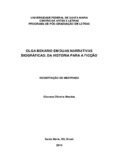| dc.creator | Mendes, Giovana Oliveira | |
| dc.date.accessioned | 2014-10-16 | |
| dc.date.available | 2014-10-16 | |
| dc.date.issued | 2014-03-10 | |
| dc.identifier.citation | Mendes, Giovana Oliveira. Olga Benario in two biographical narratives: from history to fiction. 2014. 143 f. Dissertação (Mestrado em Letras) - Universidade Federal de Santa Maria, Santa Maria, 2014. | por |
| dc.identifier.uri | http://repositorio.ufsm.br/handle/1/9901 | |
| dc.description.abstract | The present work constitutes a comparative study between two biographical
novels, one of them belong to the category of non-fiction novel. The first, titled Olga
Benario, is authored by the German writer Ruth Werner. The second, Olga, was
written by the Brazilian journalist / writer Fernando Morais. The two texts, in their own
way, try to reconstruct the life of one that became known as "the Jewish communist,
mate of Luís Carlos Prestes, who had surrendered to Hitler by Vargas government."
This study focuses on the analysis of these two biographies, both in relation to
specific elements of the genre which they belong as to their content of historical
nature, so that it is possible build relations between them, checking on which aspects
they approach and on which are distant, and at which moments establish a dialogue
with the actual fact. At the same time, it intends, at the end of the analysis, have an
outlined image of the character Olga according to the Brazilian and German versions.
Structurally, the dissertation is divided into three chapters, which are added to the
introduction and final considerations. The first deals with some definitions of the
biographical genre, as well as the particular characteristics of each of the novels in
question, the second one is constituted of a brief contextualization of the period
portrayed in the two biographies, from 1923 to 1942, with descriptions of some
Brazilian journalists and historians about each epoch and confrontation with
passages of literary texts. The third includes a comparative analysis of some
passages from the writings of Werner and Morais, emphasizing the historical content,
how the facts are narrated and the implicit social critique in discourse. Finally, the
final considerations are presenting with the closing of the discussions proposed
initially. | eng |
| dc.format | application/pdf | por |
| dc.language | por | por |
| dc.publisher | Universidade Federal de Santa Maria | por |
| dc.rights | Acesso Aberto | por |
| dc.subject | Literatura | por |
| dc.subject | História | por |
| dc.subject | Biografia | por |
| dc.subject | Olga Benario | por |
| dc.subject | Comunista | por |
| dc.subject | Literature | eng |
| dc.subject | History | eng |
| dc.subject | Biography | eng |
| dc.subject | Communist | eng |
| dc.title | Olga Benario em duas narrativas biográficas: da história para a ficção | por |
| dc.title.alternative | Olga Benario in two biographical narratives: from history to fiction | eng |
| dc.type | Dissertação | por |
| dc.description.resumo | O presente trabalho se constitui em um estudo comparativo entre dois
romances biográficos, sendo um deles pertencente à categoria Romance-
Reportagem. O primeiro, intitulado Olga Benario, é de autoria da escritora alemã
Ruth Werner. O segundo, Olga, foi escrito pelo jornalista/escritor brasileiro Fernando
Morais. Os dois textos, à sua maneira, tentam reconstruir a vida daquela que ficou
conhecida como a judia comunista, companheira de Luís Carlos Prestes, que fora
entregue a Hitler pelo governo Vargas . O objetivo deste estudo está centrado na
análise dessas duas biografias, tanto em relação aos elementos próprios do gênero
a que pertencem quanto ao seu conteúdo, de cunho histórico, a fim de que se
possam construir relações entre as mesmas, verificando em quais aspectos se
aproximam e em quais se distanciam, e em que momentos estabelecem um diálogo
com o fato real. Ao mesmo tempo, intenciona-se, ao final da análise, ter uma
imagem delineada da personagem Olga de acordo com as versões brasileira e
alemã. Estruturalmente, a dissertação se divide em três capítulos, que se somam à
introdução e às considerações finais. O primeiro trata de algumas definições sobre o
gênero biográfico, bem como de características particulares de cada um dos
romances em questão; o segundo se constitui de uma breve contextualização do
período retratado nas duas biografias, que vai de 1923 a 1942, com descrições de
alguns historiadores e jornalistas brasileiros sobre cada época e a confrontação com
passagens dos textos literários. Já o terceiro contempla uma análise comparativa de
algumas passagens dos textos de Werner e de Morais, enfatizando o conteúdo
histórico presente, a forma como são narrados os fatos e a denúncia social implícita
no discurso. Por fim, apresentam-se as considerações finais, com o fechamento das
discussões propostas inicialmente. | por |
| dc.contributor.advisor1 | Umbach, Rosani Úrsula Ketzer | |
| dc.contributor.advisor1Lattes | http://lattes.cnpq.br/5773862679226891 | por |
| dc.contributor.referee1 | Silva, Mara Lúcia Barbosa da | |
| dc.contributor.referee1Lattes | http://lattes.cnpq.br/0997199072670543 | por |
| dc.contributor.referee2 | Werlang, Gérson Luís | |
| dc.contributor.referee2Lattes | http://lattes.cnpq.br/0962194447635657 | por |
| dc.creator.Lattes | http://lattes.cnpq.br/9447407492460266 | por |
| dc.publisher.country | BR | por |
| dc.publisher.department | Letras | por |
| dc.publisher.initials | UFSM | por |
| dc.publisher.program | Programa de Pós-Graduação em Letras | por |
| dc.subject.cnpq | CNPQ::LINGUISTICA, LETRAS E ARTES::LETRAS | por |


